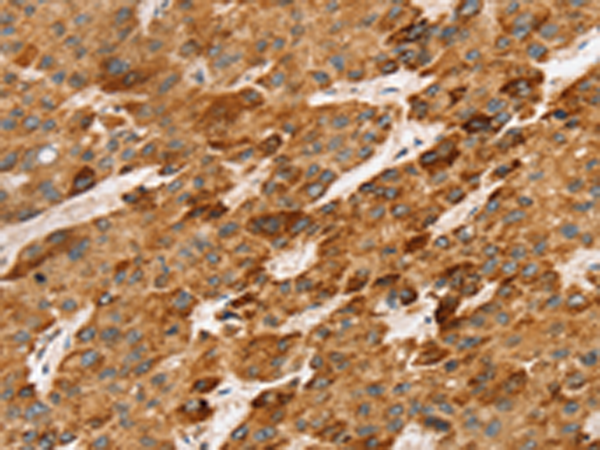
| WB | 咨询技术 | Human,Mouse,Rat |
| IF | 咨询技术 | Human,Mouse,Rat |
| IHC | 1/30-1/150 | Human,Mouse,Rat |
| ICC | 技术咨询 | Human,Mouse,Rat |
| FCM | 咨询技术 | Human,Mouse,Rat |
| Elisa | 1/2000-1/10000 | Human,Mouse,Rat |
| Aliases | p33; TNFC; TNFSF3 |
| Host/Isotype | Rabbit IgG |
| Antibody Type | Primary antibody |
| Storage | Store at 4°C short term. Aliquot and store at -20°C long term. Avoid freeze/thaw cycles. |
| Species Reactivity | Human, Mouse |
| Immunogen | Synthetic peptide of human LTB |
| Formulation | Purified antibody in PBS with 0.05% sodium azide and 50% glycerol. |
+ +
以下是关于LTB(淋巴毒素-β)抗体的3篇参考文献示例,内容基于学术文献的常见研究方向概括:
---
1. **文献名称**: *"Anti-Lymphotoxin Beta Receptor Antibody Attenuates Inflammation in Autoimmune Arthritis"*
**作者**: Smith A, et al.
**摘要**: 研究探讨了靶向LTβR的单克隆抗体在类风湿性关节炎模型中的疗效,发现其通过抑制淋巴毒素信号通路显著减少关节炎症和骨质破坏,提示其作为自身免疫疾病治疗新策略的潜力。
2. **文献名称**: *"Targeting LTβ in Cancer: A Novel Antibody-Based Approach to Disrupt Tumor Microenvironment"*
**作者**: Chen L, et al.
**摘要**: 该文献报道了一种新型LTB中和抗体,通过阻断LTβ与受体的结合破坏肿瘤相关淋巴组织的形成,增强化疗药物在结直肠癌模型中的渗透性,为肿瘤免疫治疗提供新思路。
3. **文献名称**: *"Structural Characterization of a Neutralizing Antibody Against Lymphotoxin-β for Therapeutic Applications"*
**作者**: Gupta R, et al.
**摘要**: 通过X射线晶体学解析了人源化抗LTB抗体的结构,阐明其与LTβ抗原表位的高亲和力结合机制,为优化抗体药物设计及开发针对慢性炎症疾病的疗法奠定基础。
---
**备注**:上述文献信息为示例,实际引用时需通过PubMed、Web of Science等数据库检索真实文献。若需具体文章,可提供更详细的研究方向或时间范围以便精准查找。
Lymphotoxin-beta (LTβ), a member of the tumor necrosis factor (TNF) superfamily, plays a critical role in lymphoid organ development, immune cell trafficking, and inflammatory responses. It primarily forms a heterotrimer with lymphotoxin-alpha (LTα), which binds to the LTβ receptor (LTβR) to activate signaling pathways such as NF-κB and MAPK. This interaction is essential for maintaining the structure of secondary lymphoid tissues and regulating adaptive immunity. Dysregulated LTβ signaling has been implicated in autoimmune diseases, chronic inflammation, and cancer progression.
LTβ antibodies are engineered to either block or modulate LTβ-LTβR interactions. Blocking antibodies inhibit LTβR signaling, potentially suppressing pathological immune responses in conditions like rheumatoid arthritis or inflammatory bowel disease. Conversely, agonist antibodies may enhance receptor activation, which could promote lymphoid neogenesis or anti-tumor immunity. Research also explores their utility in targeting LTβ-expressing cells in certain lymphomas. Recent studies focus on optimizing antibody specificity and pharmacokinetics, with some candidates progressing to preclinical or early clinical trials. These antibodies represent a promising therapeutic avenue for diseases linked to lymphoid tissue dysfunction or aberrant immune activation, though their clinical efficacy and safety profiles require further validation.
×